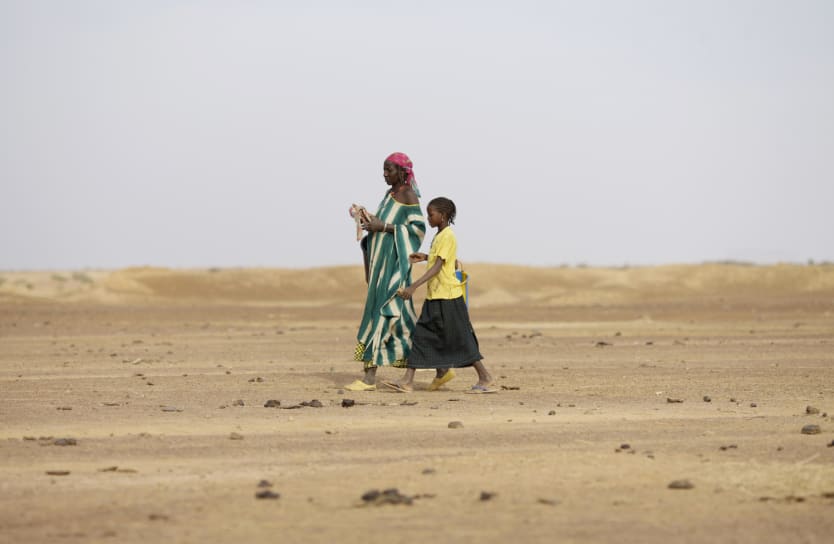
When we talk about building communities in Mali — my home country — the discussion must start with the most basic of building blocks.
We are one of the poorest nations in the world. Two-thirds of my country is desert and water scarcity is a huge problem.
An estimated 5.5 million people in Mali do not have safe drinking water and over 12 million — 80 percent of our population — do not have adequate sanitation.
Just over a year ago, Mali was plunged into civil war as militants took over the north of the country and France staged a military intervention to push them back. Today, sporadic violence continues, even as people begin to rebuild their lives and homes.
Before the war, the situation with regards access to clean drinking water and adequate sanitation was poor. Now it is even worse.
Passion and personal experience
My passion for WaterAid's work comes from personal experience. I grew up in a village near Tombouctou — in the north of Mali — that had no access to safe water or sanitation.
Because I am the eldest of seven, many of the responsibilities of the household fell to me, including looking after the other children and collecting water for the whole family.
Water scarcity was a real problem in my village. When I went to collect water I would have to get up at 4 a.m. When I got back, my baby siblings would be crying because they were so thirsty.
In the dry season it was common for our community to pack up and go on the road to find water. People were even forced to cross international borders with their animals, to neighbouring Burkina Faso and even as far as Ghana.
Many people, especially children, would succumb to disease or even thirst during the dry season. Schools would often close because of a lack of safe water.
Despite my water-collecting duties, I loved school, and went as often as I could. As I grew older, however, my grandparents did not want me to go to school. For them, the duty of a woman was to get married, to have children and to keep her husband happy.
But I was lucky that a teacher at the local school noticed I showed promise, and pushed my parents to continue to allow me to attend. From this I was fortunate enough to gain a scholarship to study abroad, in Germany and Russia, and later post-graduate studies in Canada.
Full circle to Mali
I always planned to go back to Mali to start helping my country towards getting access to clean drinking water and adequate sanitation for everyone, everywhere. In 2006, I began working for WaterAid as the organization’s country representative in Mali.
I feel that I am like an ambassador for women in Mali, being able to show them that women can succeed just as men can. I want to mentor women in my country to show them what they can achieve.
Getting safe water in some places in Mali is so difficult that it is seen as a gift from God. We cannot even provide water for our animals every day.
People, especially women, can’t imagine that access to safe drinking water is a human right. We need to empower women to be able to successfully ask for recognition to their right to water and sanitation from local governments and from policymakers. These women need to become part of the process themselves.
Today, there are many post-conflict challenges in rebuilding healthy, productive communities. But first among them is access to water and sanitation for everyone — men and women, old and young, disabled and able-bodied.
The question now is how can Mali recoup its lost ground? WaterAid is currently working in five regions in Mali, to restore access where it was lost, and extend it to new communities.
Prioritizing water and sanitation
Mali’s government has committed to making water and sanitation a priority too, with a new dedicated minister for sanitation and a separate minister for water.
Both plan to attend the critical High Level Meeting on Sanitation and Water for All in Washington, D.C. just ahead of the World Bank Spring Meetings in April. We at WaterAid hope the minister of finance will join them — along with other representatives from the world’s developing nations — to pledge their commitments toward getting water and sanitation to everyone, everywhere by 2030.
There is still so much to do, and Mali faces special challenges. Even my own home village had achieved better access to safe water from hand pumps. Many of them now lie in ruins after the fighting.
WaterAid reached 43,000 people in Mali last year with safe water, and 39,000 people with sanitation. But we have a long way to go in the area of sanitation as 78 percent of Malians still do not have anywhere safe or hygienic to go to the toilet.
These services are life-transforming for anyone, but particularly when it comes to women.
When we have safe water and sanitation nearby, we have healthier pregnancies, healthier children and more time and energy to devote to our own activities, whether it’s caring for our families or engaging in outside work to support them.
And perhaps most importantly, these services mean our daughters can stay in school, giving them a better education and more hope for our future.
Want to read more? Check out She Builds and tweet us using #SheBuilds.








